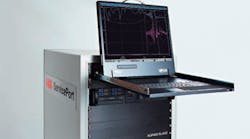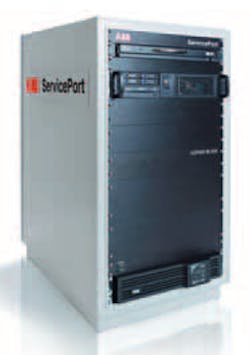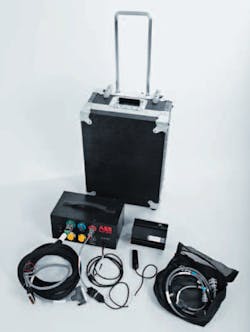Although advanced services have long been among ABB's offerings, they have often been viewed as reactive tasks that are a "necessary evil" required to support sophisticated products. Service delivery was often only as good as the individual performing the task. Less successful service provisions could lead to unhappy customers and even lost business. A common goal for many ABB product groups is to create designs that are robust and that require less service.
The paradox is that the better ABB products become in automating customer processes, the higher the demand for value-added ABB services. This is because customers are now operating with fewer staff of their own, in some instances reducing or even eliminating process engineers. When something goes wrong, customers still need process experts to troubleshoot the problem, and ABB is often called because of its expertise in the process automation area.
The demand for expert ABB service is also fueled by the rapid growth of emerging economies such as Brazil, China and India. While ABB can respond to increased equipment demand reasonably well, in some instances by transferring entire factories to high-growth countries, it is difficult to transfer whole teams of process experts to emerging economies, or to replicate its many years of experience in new, local teams.
Whereas ABB strives to send their most experienced process engineers to the parts of the world where they are most needed, or to where they can make the biggest impact, there are simply too few such experts to meet the rising demand. Even if enough experts could be found to canvass the globe meaningfully, they still would struggle to operate consistently as their experience, insight and approaches would vary.
Automating services
Service experts have long had methods for collecting and analyzing customer diagnostic information. These methods are very effective in the right expert's hands. Some are documented and engineers are trained on them. But if they are only used every few months, then engineers often have to relearn the method for each new job. To provide consistency, ABB began, some years ago, to write software tools that automate some of these methods to make them simpler, repeatable and expeditious. So, instead of a method that is effective only in the hands of a limited number of experts, or for a limited number of customer processes, these automated service tools capture and analyze data so effectively that they can be used by less experienced engineers and for multiple customer processes. This reduces the effort needed to capture and analyze data at customer sites and frees up more time to concentrate on solving the actual underlying problem.
When these tools were originally developed, ABB's background as a products company meant that it did not focus on service as a high-growth business opportunity. It was a desire to protect the ABB installed base, rather than grow service, that motivated the initial investments in these automated service tools. The results from the first automated service tool were so startling that this attitude was very soon revised.
The service tools were engineered as a direct response to customer needs for process troubleshooting, even though the customers did not necessarily anticipate exactly how these tools would help. Many customers tend to feel only the immediate pain points of their process, and they focus solely on fixing that pain. A better approach is to determine and fix the source of the pain, so as to provide a long-term solution. The high-level automated service tools uncover this source so ABB experts can permanently remediate the process problems ➔ 1.
1 ABB’s automated service tools can bring huge benefits to a wide variety of processes, such as the papermaking process shown here.
Service toolkit
ABB's current achievements in system and process optimization owe much to the success of the first automated service tool and its many successors.
The main function of these tools is to quickly and consistently capture data from process control systems and analyze that data to produce key performance indicators (KPIs), from which conclusions can be drawn. The tools standardize and automate less structured methodologies and enable engineers with varying levels of experience to collect and analyze data meaningfully. This is an important breakthrough in ensuring repeatability.
The initial automated services tool development, which addressed customer process issues in one industry and geography, led to the development of several such tools that address customer process issues for multiple industries and geographies. These tools include:
- MD Analyzer: Provides automated analysis of process controls that control linear (or "machine-direction") parameters in a production process.
- CD Analyzer: Provides automated analysis of process controls that control cross-linear (or "cross-direction") parameters in a production process.
- AGP500 ("Acquisition of Gauging Process Data"): Provides automated analysis of data collected by in-line instruments or sensors, which measure process parameters that can be automatically controlled.
- DL300 ("Data Logger"): Used during transitions (such as grade changes) to expose discrete events. It captures data constantly in a buffer so that when a discrete event occurs, the tool has significant data before and after the event to more meaningfully analyze the source of trouble.
These tools monitor process parameters and automatically and expeditiously identify events and situations that require attention. Previously, highly experienced process experts would have had to collect, sift through and analyze very large quantities of data to achieve similar results.
Somewhat contrarily, while these automated service tools eased the pressure for experienced experts to be at customer sites for lengthy periods, the awakening demand for the new, improved process analysis created, in turn, a necessity for more experts to be on-site to conduct it. As emerging economies grew, this necessity increased even further. In addition, after successful problem resolution, the customer very often requested more of these services. To continue to meet customer demand, more ideas were needed.
Remote delivery
ABB process experts were traveling from site to site with the automated service tools and the unique connectivity hardware required to expedite customer data collection. However, if this unique hardware were to remain at the customer site, it would be possible for the expert to access and analyze data remotely and fix the customer problem, even when offsite. In fact, the problem could be fixed faster and at lower cost since travel time and expenses would be eliminated. The analysis could also be carried out more often and on a regularly scheduled basis, in accordance with customer needs.
At first, customers were cautious. Remote connection to their systems was perceived as a data security risk. But the unique hardware was already connected to the customer process on-site. The remote interface was designed to connect only to this hardware, drawing data from it without directly connecting to the customer process. The customer's data is protected. Furthermore, customers were given discretion over the level of security implemented.
This approach was used to perform even more process analysis and troubleshooting for customers, at a lower cost, thereby increasing value for customers and for ABB. Customers spent less to get more of what they wanted and ABB was able to provide high-level analysis to more customers without overtaxing their service experts.
Thus was born the ABB ServicePort service delivery device ➔ 2. The unique hardware that expedited process connection and data collection already existed as part of an ABB process expert's "took kit." The device was not designed to be left at the customer site. However, when it was realized that the best way to meet customers' needs was to leave this hardware on-site and collect and analyze data remotely, the first field test of what was to become the ServicePort can be said to have taken place.
After initial customer testing of this concept indicated a strong market reception, engineering of remote optimization services for repeatability began. The eventual deliverable needed to include the unique connection/collection hardware, engineered for easy access and connection by customers. Because a desirable aspect of this unique hardware is its portability (ie, ease of connection to various processes in different parts of a customer plant), the customer version features a docking station in the Service- Port. While the automated service tools were something that could reside remotely, it was decided that this portability tool would reside in the ServicePort to offer maximum flexibility in collecting and analyzing data remotely and on-site ➔ 3.
3 ServicePort provides a range of tools for expert service.
Cost-effective solution wins papermaker's business
U.S. Corrugated's 100 percent recycled containerboard mill is one of the world's greenest paper operations. The mill, located in Cowpens, South Carolina, recycles and reuses all of its water, keeping its process water out of local streams, rivers and sewers. A winner of multiple environmental awards, the mill also prevents the unpleasant paper production odors from spreading through the surrounding area by using natural gas and electricity to generate steam for its paper- drying process.
While the mill uses ABB's distributed control system (DCS) to automate its production processes, U.S. Corrugated recently added advanced ABB quality control systems (QCSs) to ensure product quality. After the installation, the mill consulted with ABB about how they could cut service delivery costs but still optimize process performance.
Because of ABB's modular and flexible optimization service delivery approach, U.S. Corrugated chose ABB's Service- Port to provide secure, on-demand diagnostic and troubleshooting support remotely.
Using a beta version of ServicePort, ABB specialists were able to effectively monitor and troubleshoot as needed by connecting remotely, resulting in considerable savings in time and money.
Additionally, ABB has helped the Cowpens mill increase product quality, reducing the product variability substantially (the average paper basis weight 2-Sigma is below 0.5 and the average paper moisture level 2-Sigma is below 2). By keeping quality high, customer complaints have been all but eliminated while production has increased, giving the Cowpens mill the financial benefits sought by U.S. Corrugated.
Expanding applications
As is the case with many successful products, other applications and opportunities for ServicePort come up constantly. For instance, every control system ABB has sold has a PC with system configuration tools on it. For a small additional cost, the system configuration tools could be delivered in ServicePort, thus providing important installation and commissioning tools for startup in the same device that can later be used to deliver remote system and process optimization once the plant is in normal operation.
Other applications are currently part of the design. The ServicePort is sometimes referred to as the "cable box" due to its similarities to cable TV hardware: One data stream enters the device and is split into multiple "channels." ABB is creating new channels of content, including:
- System configuration
- Preventive and corrective maintenance
- Service scheduling
- Work order tracking
- Spare parts management and ordering
- System optimization
- Process optimization
- Condition monitoring
- Event notification
- Support services
A package of initial content is being decided upon for formal launch (beta versions are in operation at various customer sites; formal launch is awaiting patent approvals).
Remote service benefits customers and ABB
For customers, the main advantage of ServicePort is the provision of easy and fast system and process optimization from ABB experts at any time, from anywhere in the world. For ABB, ServicePort helps meet the growing customer demand for such services.
Culturally, ServicePort changes the service interaction between customers and ABB. ServicePort acts as a "cable TV box," presenting easy access to a wide variety of services that customers may never have used before, making it easy for them to evaluate and acquire the services. Its ability to collect and evaluate system and process data from competitive systems increases the customers' range of service options as well as ABB's attractiveness as a service provider. This level and range of service availability and access maximizes ABB process automation life cycles, which is good for the long-term success of customers and ABB alike.
Kevin Starr
ABB Process Automation LifeCycle Services
Westerville, OH, United States
[email protected]





